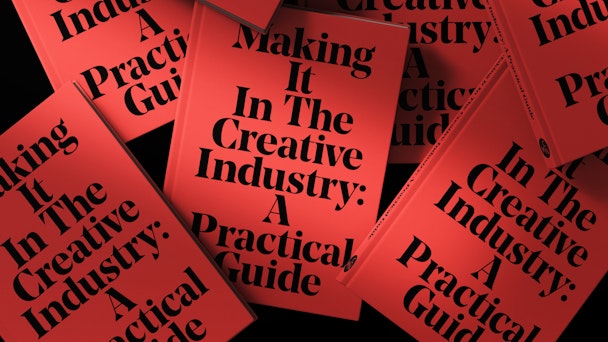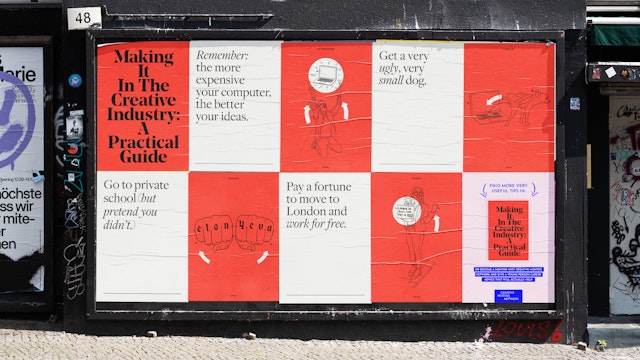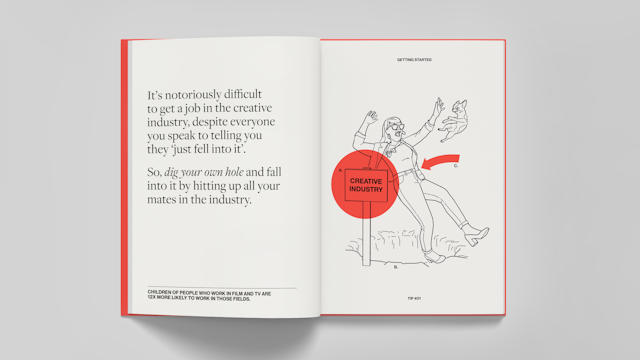‘It’s not about your ideas’: book lampoons creative fields’ socio-economic inequality
With the number of working-class people in the creative industries falling, the Creative Mentor Network hopes that their satirical campaign will recruit advocates for change.

The Creative Mentor Network is satirizing the creative industries in a new book / Credit: Creative Mentor Network / AnalogFolk
UK charity the Creative Mentor Network (CMN) has released a book sending up the lack of socio-economic diversity in the creative industry.
Cheekily titled Making It In The Creative Industry: A Practical Guide, it’s a lesson in not judging a book by its cover. Styled as a how-to, it’s anything but. Instead, it’s an excoriation of the industry’s insularity, classism, and silliness.
Advertisement
With illustrations from award-winning artist Tobatron (Toby Leigh) and copy from creative partner AnalogFolk, the work makes a wide swathe of criticisms about who the industry excludes, and how it perpetuates that exclusion.

The campaign will first target 250 creatives in the UK (“people with power, and people who’ve got a voice to make change,” across film, theater, TV, arts, and architecture as well as advertising, says CMN’s marketing lead Miles Zilesnick). Each will receive a copy of the book and a letter exhorting them to become mentors to people from underrepresented socio-economic backgrounds.
The charity is also making a splashier out-of-home play: a pair of billboards at London’s Old Street roundabout and a flyposting effort in London and Manchester.
Dressed up as self-help, the book’s withering aphorisms take a scattergun approach to the industry’s socio-economic ills.
Advertisement
On nepotism, the book bemoans the number of people with industry connections declaring that they ‘just fell into’ a creative role. “So, dig your own hole and fall into it by hitting up all your mates in the industry.”
On making underrepresented people feel unwelcome, it says “There is a good reason why imposter syndrome is so common among people from lower socio-economic backgrounds: the creative industry is silly and everything is made up. Literally, no-one knows what they’re doing, but some people are more comfortable pretending they do.” It’s the tongue-in-cheek solution? “Live with debilitating self-doubt inwardly, but emit boisterous arrogance outwardly.”

And on the industry’s often labyrinthine relationships with class, it says: “Attending a private school will give you an enormous advantage over others, so if it’s not too late, then go to one. However, under no circumstances should you tell anyone that you went to a private school. Cover it up by adopting the slang, dress sense and music tastes of your state-educated counterparts.”
Other targets include the UK’s continued London-centrism (despite claims of ‘borderless creativity’); hiring for ‘culture fit’ as a means to propagate insularity (“be like the amoeba – you want to aim for homogenous too”); its drinking culture; the ubiquity of office dogs and people named Matt and Tom; useless entry-level degree requirements; accent discrimination; and arcane rules about just how formally to dress.
Peppered with research findings to back up its claims, it’s clustered around one point: that, while creative employers still have much work to do on the areas of diversity they’re aware of, socio-economic inequality is largely ignored and getting considerably worse. As recent research from the universities of Manchester, Edinburgh and Sheffield highlighted, the number of creative workers from working-class backgrounds fell from 16.4% for baby boomers to 7.9% among the current generation of young talent.
Suggested newsletters for you
A mirror to the industry
When The Drum sat down with the team behind the book, they say that it wasn’t difficult to come up with a list of industry ills – or a list of the seemingly-benign measures that prevent change. “We didn't have to look very far to find some of the barriers into the industry,” says the book’s writer, Jake Doran. “There are a number of things that look completely innocuous, but start to realize, ‘Oh, this is why the industry is so homogenous’. Things like referral schemes for new hires: seem like a good idea on the face of it, but they mean we're just hiring more people that we know.”
Getting a brief to poke fun at your peers, Doran says, is as blissful as it sounds: “It’s the most fun we’ve had in the last couple of years.”
The campaign’s goals are twofold. First, as AnalogFolk’s executive creative director Colin Byrne puts it, “it’s a recruitment campaign”: a drive to find more mentors for the network. “We don't want people that are just going to toss it aside. We want people that are going to be moved by this and spread it further.”
Second, it aims to highlight socio-economic diversity as an issue demanding immediate attention by “holding a mirror up to the industry”. As Katie Thomson-Greene, CMN’s managing director, puts it, they want employers to “start tracking their socio-economic diversity within their teams. People are often not very open or forthcoming about their socio-economic status, and it’s not a visual thing. [We want] people to start taking it as seriously as other areas.”
Although jokingly delivered, Thomson says, the book’s points all come from the rather more serious training that the organization delivers to new mentors. For Doran, translating them meant “a bit of a reckoning with our own privilege… probably 80% of the pages apply to me – in a bad way.”
Regardless, the team behind the project was able to find examples from their own experience to back up the book’s claims. Thomson-Greene struggled to make unpaid fashion internships work before clocking out for the (hardly well-remunerated) charity sector. And Byrne says that markers of his working-class background continue to illicit a reaction, despite a storied two-decade career in the industry: “I see people scowl, sometimes, when they first meet me. Then you get involved in a conversation, we have a chat, and there’s a bit of warmth there, and you see their opinions change. I’ve been seeing that for 25 years.”
Content created with:

AnalogFolk
Our mission is to use digital technology to make the analog world better and to also be an impactful agency of change for people, brands and society, in pursuit...
Find out more
